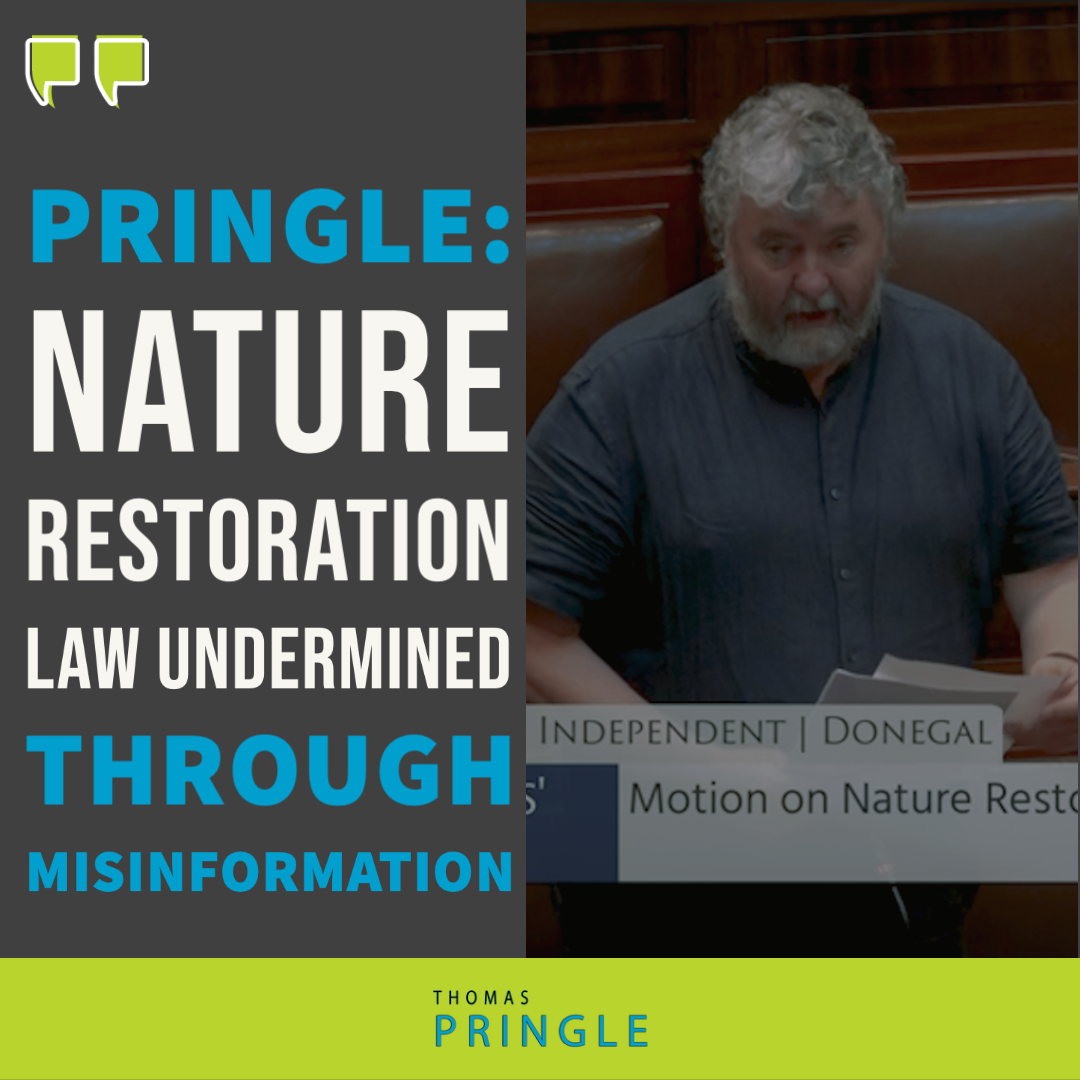- Pringle: We need a policy that recognises the importance of inshore fishing
- Pringle: Disabled people and carers face crisis of State neglect
- Pringle: Failed FF/FG housing policies forcing people to put their lives on hold
- Pringle welcomes Donegal council motion on Occupied Territories Bill: ‘We cannot stand by in the face of genocide’
Pringle: Nature Restoration Law undermined through misinformation
- Updated: 6th July 2023

Independent TD for Donegal, Thomas Pringle, said the importance of the European Commission’s Nature Restoration Law has been undermined through scaremongering and misinformation.
Addressing the Dáil today, Deputy Pringle said: “Because this legislation is so important, it is absolutely vital that the information presented today is correct, factual and in the best interests of all involved.
“The future of our environment involves every single one of us and it is for this reason that my aim today is to counteract the scaremongering and misinformation with verified information, scientific fact, as well as the realities faced by the farming community,” he said.
He called the law, “the most substantial piece of nature legislation that has been put forward by the EU in decades.”
Deputy Pringle said: “The Report of the Citizens’ Assembly on Biodiversity Loss, published in March of this year, found that ‘over a quarter of Ireland’s regularly occurring bird species are in danger of extinction, at least one-third of protected species are declining in population, almost 30% of our semi-natural grasslands have been lost in the last decade, less than half of our marine environment can be described as healthy, over 70% of our peatlands are in bad status and only a small fragment remain intact, the majority of our agricultural soil is in a suboptimal state, contaminated by nitrates and phosphates and we are consistently losing our hedgerows.’
“As well as this, our water quality is continuing to decline, ‘with almost 50% of freshwater systems in Ireland in poor and deteriorating condition’.
“These are the facts as outlined by the report. And there is no doubt that nature restoration is something that we have to do. It is absolutely essential that we restore biodiversity and bring our lands and water back to a condition where life can be sustainable in the long run.”
Deputy Pringle said: “It is devastating to me then that the importance of this has been completely undermined and the issue has been completely hijacked to create a farmer vs environment debate. Let me make it clear, no one is closer to the environment than farmers are and no one will benefit from nature restoration as much as farmers will. Our farmers know better than anyone the importance of addressing climate change and ensuring that the future of farming is protected.
“I believe much of the ‘controversy’ surrounding this law has been stirred up by agri lobbyists and even some government MEPs in order to scare the farming community out of supporting what’s in their best interest. And I don’t blame the farming community for being anxious. Anyone who knows me or has heard me in the chamber knows that I am extremely sceptical of the EU. I have never shied away from criticising EU institutions and the proposals put forward.”
He said: “But I want to assure farmers that under the Nature Restoration Law, they will not be forced to rewet their peatlands, and any suggestion otherwise from politicians is either disingenuous or wrong. In fact the Nature Restoration Law doesn’t address specific implementation at all, it only sets the targets.”
The deputy was speaking on the Independent Motion re Nature Restoration Law.
He said: “The truth is the Government has complete flexibility regarding implementation at national level as the law allows member states to determine for themselves how best to achieve the targets as they relate to national circumstances,” adding: “It is completely disingenuous for Government MEPs and the Taoiseach himself to mislead farmers and the public on this.”
Deputy Pringle said: “The Nature Restoration Law does not force farmers to rewet their land, in fact it doesn’t mention farmers at all. If the government wanted to, they could decide not to involve farmers altogether. In fact, we don’t need to involve them.”
He said one of the proposals looks for Ireland to rewet approximately 116,000 hectares by 2050 in and noted that Bord na Mona have committed to rewetting 80,000 hectares and Coillte have committed to rewetting 30,000 hectares.
Deputy Pringle said: “They alone will meet the Irish target without touching farmers, but why has this has not been communicated.” The deputy said the State can also decide how to compensate possible short-term costs linked with loss of income that certain groups may incur.
The deputy said: “Even if the government does decide to include farmers, it will be the choice of farmers whether to sign up for rewetting and they will be compensated for doing so. Despite the misinformation being spread, nobody will be forced to do anything as far as I can see, and so long as our Government implements the directive effectively and properly, then farmers can be protected.”



